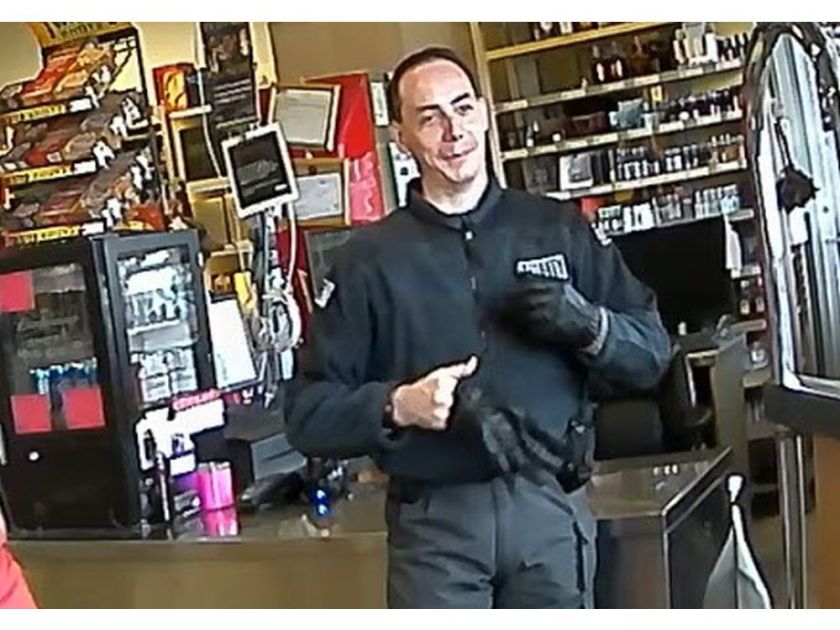Edmonton Man Uses ‘Involuntary Celibacy’ as Excuse in Stomping Death

A 38-year-old former security guard in Edmonton, Alberta, said that being “involuntarily celibate” contributed to him killing a man while on the job.
Sheldon Russell Bentley was sentenced to four years in prison for manslaughter on Wednesday for an incident that occurred on July 31, 2016 behind a strip mall supermarket, Lucky 97. While on a shift there, Bentley stomped on the torso of a 51-year-old man who’d been sitting in a back alley.
Another security guard reportedly had tried to wake up the man in the alley, Donald Doucette, before calling Bentley for help. Bentley also robbed the man, taking a $20 bill from his hand. (He’s serving a six-month sentence for that robbery.)
Bentley’s combat boot “made an audible thump,” causing two big tears in Doucette’s abdomen, which then filled with two litres of blood, according to a closing argument by a Crown prosecutor.
“He was frustrated with his lot in life, he was angry at the world,” Justice Paul Belzil said of Bentley, StarMetro Edmonton reports.
Bentley’s use of the term “involuntarily celibate” nods to the “incel” community, which the Toronto van attacker Alek Minassian appeared to be associated with when he allegedly killed 10 people and injured 16 this April.
“Incel” is short for “involuntarily celibate” and is a term some sexless men use to refer to themselves. The incel community has festered online with its members participating in forums and chatrooms where fantasies of violence, particularly against women, are discussed and, at times, encouraged.
In a pre-sentence report, Bentley described the stress he was under in his life when he killed Doucette, including his “involuntary celibacy” for the four years leading up to the incident. He recalled being harassed by people while he was working as a security guard, as well as being referred to as “Pee-wee” due to his resemblance to Pee-wee Herman. His lawyer said he was physically abused as a child.
“I am sickened at who I was,” Bentley told the court and Doucette’s family members who were present at the time. “I don’t like what I’ve become. I am very sorry for what I have taken from you.”
According to Felix Amato, associate professor in the School of Social Work at Salem State University, Bentley’s “involuntary celibacy” may tell part of the story of how the man became violent, but it doesn’t excuse the behaviour. Amato has worked for 25 years in a clinical social work setting, has experience treating violent men, and has expertise in the subject of masculinity.
“It’s not an excuse for violence because we, in terms of a healthy society, need to be able to feel safe—every individual is responsible for his or her own actions,” Amato told VICE. “You may be able to say this is why he or she did this nasty or horrific thing, but that doesn’t make it OK or so there shouldn’t be repercussions.”
Amato said individual responsibility and the ability to tell right from wrong supersedes an explanation like “involuntary celibacy.”
Bentley reportedly carried weapons with him, such as a pair of nunchucks and a pellet gun in his backpack, to make him feel more confident. A report presented in court called him a “fearful man, afraid of the world around him.”
When testifying in court, Bentley’s coworker Muhammad Sharma said the man kept a “black whip” in his locker and claimed he carried bear spray and a knife, according to the Edmonton Journal.
After stomping on the man’s torso, Bentley reportedly threatened to kick him again if he didn’t get up. According to Sharma, who was the other security guard present during the incident, Doucette then asked Bentley, “Why are you so mean?”
“There’s the expectation that [men are] supposed to be virile and conquering of women, and they’re supposed to have sex frequently,” Amato said. But, when it comes to using the failure of living up to this expectation being used as an excuse for violence, Amato said that’s simply “irrational” and “dysfunctional.”
Amato said access to mental health treatment needs to be increased to address issues with toxic masculinity in our society. As well, he said education on the topic needs to be part of schooling so that young boys and men learn about these issues from an early age.
In an apology, Bentley said he wanted to use the comic book character Captain America as a role model for his values in the future.
It’s the same character his former coworker Sharma likened him to when others would call him “Pee-wee.” Sharma said calling him Captain America made Bentley “happy.”
Though Bentley will likely be in prison for years, Amato stresses this environment is not conducive to addressing potential issues with masculinity the man may have, as indicated by his reference to “involuntary celibacy.” It could even make it worse.
When released, Amato said a person like Bentley would need reintegration, a process he said is lacking in resources.
“You have to take them out of their environment and give them a healthy, nurturing environment,” Amato said, adding that mental health treatment should also be part of the equation. “Get them a job, a place to live, out of the environment they originally started with, restrict them from being online—specifically in these chatrooms where violence is accepted or condoned.”
Sign up for the VICE Canada Newsletter to get the best of VICE Canada delivered to your inbox.